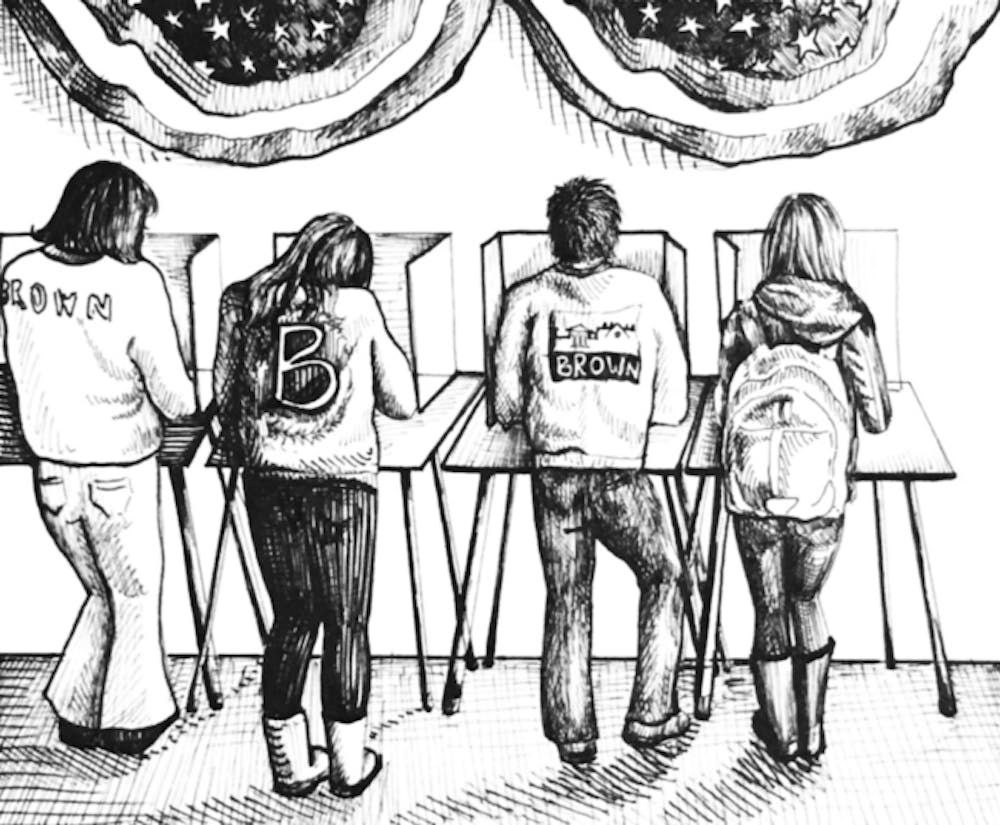As COVID-19 upends daily life across the country and around the world, political campaigning has largely been put on pause. But students across the Ivy League — of which all eight schools have transitioned to virtual classes — are persisting in their efforts to boost voter turnout for the 2020 U.S. presidential election.
Kimberly Collins ’22 and Madison Mandell ’22 represented Brown in late February at the inaugural meeting of the Ivy League Voting Challenge, a nonpartisan, student-led voting initiative to increase civic engagement before the 2020 election. The meeting, hosted at the Institute of Politics at Harvard’s John F. Kennedy School of Government, brought together representatives from all eight Ivy League schools.
A little over a month later, the world looks vastly different, but Collins and Mandell remain committed to their cause. “Voter turnout is not what it should be,” Collins said. “Our institutions should be doing more to promote student engagement.” While 45.1 percent of Brown students voted in the 2018 midterm election, 6 percent more than the national university student average, The Herald previously reported, Brown student turnout was still 8 percent below the national average.
While the details of the Ivy League Voting Challenge have yet to be finalized, students are drawing inspiration from intercollegiate voter participation challenges — such as the Big Ten Voting Challenge and New England Small College Athletic Conference Votes — in their efforts to improve civic engagement among young people.
Beyond voter turnout, universities that participate in the Ivy League Voting Challenge will also be judged on their ability to complete tasks such as creating a centralized website and integrating voter engagement into student orientation, Collins said.
Despite the competitive nature of the Ivy League Voting Challenge, Steve Pokorny, program manager for student development at the Swearer Center for Public Service, which is providing the initiative with administrative support, emphasized that it is a friendly competition. “It is just a way to increase enthusiasm around getting out the vote on campuses,” he said.
With the help of Pokorny, Collins and Mandell are in the process of creating a student coalition under the Swearer Center to assist efforts to boost voter turnout among Brown students. The group, which is to be called Brown Votes, will closely mirror the initiatives of the Ivy League Voting Challenge while also expanding upon them after the challenge concludes.
Anyone interested in increasing student turnout and civic engagement at Brown is welcome to join Brown Votes, Mandall said, noting that group membership is not restricted to those who are already involved with voting initiatives on campus. The group is likely to officially launch in May.
Adjusting to new circumstances in light of COVID-19 has delayed the Ivy League Voting Challenge’s progress. “We needed to regroup and adjust our timeline,” Mandell said, “and focus on how we can build up excitement for the upcoming election while off-campus.” With students now away from campus, common practices to increase student engagement, such as on-campus student registration drives through tabling in common areas like the Main Green and the Blue Room, are no longer options. As a result, Collins and Mandell are now going to be relying almost exclusively on online methods such as Facebook events and social media posts to increase engagement.
The student representatives from each school remain in contact through meetings on the online communications software Zoom so that the Ivy League Voting Challenge can continue despite the difficulties presented by the coronavirus pandemic.
Collins and Mandell have not been dissuaded by the challenges COVID-19 poses to their efforts. They see the role of the Ivy League Voting Challenge as more important than ever. “Now we see civic engagement as one of the core things that people have control over in this crazy time,” Mandell said.

ADVERTISEMENT




